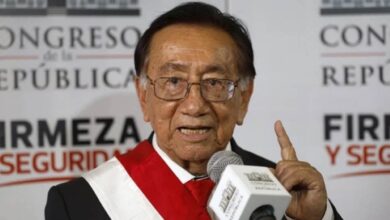Latin America: No women in power
After four women simultaneously occupied the highest government positions in the region, the situation seems to not take place this year

Latin America was used to watch women in the presidential office, even there were four female presidents simultaneously. However, for 2018, the region does not have women in power and it seems that the situation will not change in the short term.
Michelle Bachelet becomes a symbol. As president of Chile, Bachelet was the first woman to reach power through elections in Latin America in 2006. Furthermore, Bachelet is the last woman to leave office after her second non-consecutive term in 2017.
Bachelet embodies the struggle of women to reach the highest positions in the region, where this was not a common situation. Among her mandates, the former president was in charge of UN Women, as the first Secretary General and Executive Director.
Bachelet usually refers to the 'glass ceiling', an invisible barrier that prevents women from reaching the same positions of power than men. Bachelet broke the glass ceiling in the region and inaugurated a period of women in the political sphere. Furthermore, she claimed in an interview with the BBC: "I am president almost in spite of being a woman".
The former Chilean leader was followed by Cristina Fernandez de Kirchner in 2010. Kirchner became the first woman to be elected through elections to occupy the presidential office in Argentina and the second woman in exercise. Kirchner had two consecutive terms, so she held the position until 2015.
It is worth noting that the first woman to become president of Argentina was Maria Estela Martinez de Peron, who took office after the death of her husband Juan Domingo Peron in 1974. In 1976, Peron was deposed by a civilian-military coup.
Also in 2010, Costa Rica elected Laura Chinchilla as its first president. In Brazil, in 2011, Dilma Rousseff became Brazil’s president, being the first woman to do so in the country. During her tenure, she held the top of the list of most powerful women in the world, according to Forbes magazine.
What is the relevance of these mandates?
With the arrival of Bachelet’s second term in 2014, the region experienced for the first time that four countries had as chief executives four women, a milestone for Latin America.
The relevance of the mandates of these women increases in importance considering the countries addressed. In the case of Brazil, the nation is a Latin American power and leader of the region; Argentina has extensive diplomatic experience in the region; Chile is the fifth largest economy in the region (according to its GDP per capita, in accordance to the World Bank); finally, Costa Rica is a democratic example for Central America.
It should be noted that the efforts of these four ex-presidents have not been easy, and throughout their periods they had complications.
Scandals and corruption
Bachelet in Chile, left the presidency in late 2017, in a democratic castling with Sebastián Piñera. Bachelet left office on a decline in her popularity after alleged illegal activities of her son in the real estate sector. Nevertheless, the former president has a new job, from June 2018 Bachelet will head Partnership for Maternal, Newborn & Child Health.
In Argentina, Kirchner met her two constitutional mandates. However, Kirchner is the focus of criticism from the opposition and she is accused of corruption. Currently, the former president is being prosecuted for various reasons. However, thanks to her role as a senator, Kirchner has privileges that are guaranteed in the Constitution. Despite the allegations and the proceedings against the former president she continues to enjoy high levels of popularity and she could be a candidate in 2019.
The administration of Chinchilla in Costa Rica led to the growth of the economy between 4 and 5%, according to ECLAC. The increase caused Costa Rica to be one of the Latin American nations that most grew. Despite these advances, the former president garnered the worst rating that citizens gave to the last presidents. According to the consulting firm Unimer, 60% of citizens considered her administration as negative and her cabinet publicly criticized her administration.
In Brazil, Dilma was accused of violating the budget law and the law on administrative probity. Also, Rousseff was axis of suspicion for acts of corruption in the case of Lava Jato. Through an impeachment, Rousseff was secluded from the government. Vice president Michel Temer assumed the interim presidency. However, Temer presented a cabinet without women with only white men, which was an outspoken critic of public opinion.
Following a reduction in the gender gap in politics, it seems that pink tide reached a turning point and now begins to recede. It does not look that in the short term the election of women to senior positions in the region will take place.
Latin American Post | Jonathan Carné
Translated from “ América Latina: Sin mujeres en el poder”





